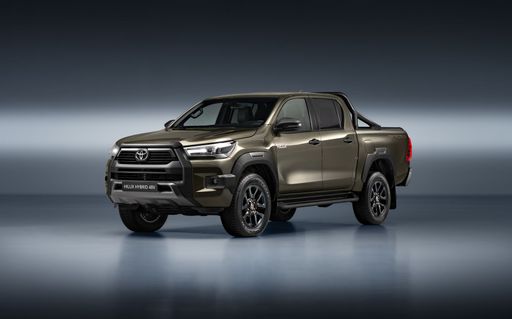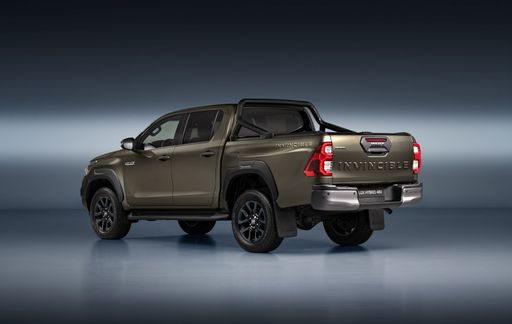Renault Express vs Toyota Hilux - Differences and prices compared
Compare performance (102 HP vs 204 HP), boot space and price (17100 £ vs 39800 £) at a glance. Find out which car is the better choice for you – Renault Express or Toyota Hilux?
Costs and Efficiency:
Looking at overall running costs, both models reveal some interesting differences in everyday economy.
Renault Express has a convincingly advantage in terms of price – it starts at 17100 £, while the Toyota Hilux costs 39800 £. That’s a price difference of around 22634 £.
Fuel consumption also shows a difference: Renault Express manages with 4.60 L and is therefore convincingly more efficient than the Toyota Hilux with 9.70 L. The difference is about 5.10 L per 100 km.
Engine and Performance:
Power, torque and acceleration are the classic benchmarks for car enthusiasts – and here, some clear differences start to show.
When it comes to engine power, the Toyota Hilux has a decisively edge – offering 204 HP compared to 102 HP. That’s roughly 102 HP more horsepower.
In terms of top speed, the Toyota Hilux performs minimal better – reaching 175 km/h, while the Renault Express tops out at 167 km/h. The difference is around 8 km/h.
There’s also a difference in torque: Toyota Hilux pulls convincingly stronger with 500 Nm compared to 240 Nm. That’s about 260 Nm difference.
Space and Everyday Use:
Whether family car or daily driver – which one offers more room, flexibility and comfort?
Seats: Toyota Hilux offers decisively more seating capacity – 5 vs 2.
In curb weight, Renault Express is decisively lighter – 1296 kg compared to 2085 kg. The difference is around 789 kg.
When it comes to payload, Toyota Hilux noticeable takes the win – 1125 kg compared to 700 kg. That’s a difference of about 425 kg.
Who wins the race?
The Renault Express proves to be wins the duel decisively and therefore becomes our DriveDuel Champion!
Renault Express is the better all-rounder in this comparison.

Renault Express
Costs and Consumption
View detailed analysis
Engine and Performance
View detailed analysis
Dimensions and Body
View detailed analysis
Renault Express
The Renault Express is a no-nonsense city van that pairs clever packaging and practical cargo space with an easy-to-drive, fuss-free character. Built for small businesses and active families, it delivers rugged reliability and low running costs without pretension — a sensible workhorse with a wink.
detailsToyota Hilux
The Toyota Hilux is a no-nonsense pick-up that blends worksite toughness with proper off-road ability, built to shrug off punishment and keep going long after fancier rivals give up. It won’t win any beauty contests, but buyers who want a practical, rugged truck that simply gets the job done will appreciate its honest, hard-working character.
details


|
|
|
|
|
Costs and Consumption |
|
|---|---|
|
Price
17100 - 19500 £
|
Price
39800 - 56200 £
|
|
Consumption L/100km
4.6 - 6.6 L
|
Consumption L/100km
9.7 - 10 L
|
|
Consumption kWh/100km
-
|
Consumption kWh/100km
-
|
|
Electric Range
-
|
Electric Range
-
|
|
Battery Capacity
-
|
Battery Capacity
-
|
|
co2
121 - 149 g/km
|
co2
253 - 264 g/km
|
|
Fuel tank capacity
50 L
|
Fuel tank capacity
80 L
|
Dimensions and Body |
|
|---|---|
|
Body Type
Cargo Van
|
Body Type
Pickup
|
|
Seats
2
|
Seats
4 - 5
|
|
Doors
4
|
Doors
2 - 4
|
|
Curb weight
1296 - 1390 kg
|
Curb weight
2085 - 2295 kg
|
|
Trunk capacity
-
|
Trunk capacity
-
|
|
Length
4393 mm
|
Length
5325 mm
|
|
Width
1775 mm
|
Width
1855 mm
|
|
Height
1811 mm
|
Height
1810 - 1815 mm
|
|
Max trunk capacity
3300 L
|
Max trunk capacity
-
|
|
Payload
575 - 700 kg
|
Payload
915 - 1125 kg
|
Engine and Performance |
|
|---|---|
|
Engine Type
Diesel, Petrol
|
Engine Type
Diesel MHEV, Diesel
|
|
Transmission
Manuel
|
Transmission
Automatic, Manuel
|
|
Transmission Detail
Manual Gearbox
|
Transmission Detail
Automatic Gearbox, Manual Gearbox
|
|
Drive Type
Front-Wheel Drive
|
Drive Type
All-Wheel Drive
|
|
Power HP
75 - 102 HP
|
Power HP
150 - 204 HP
|
|
Acceleration 0-100km/h
11.9 - 16.3 s
|
Acceleration 0-100km/h
-
|
|
Max Speed
100 - 167 km/h
|
Max Speed
170 - 175 km/h
|
|
Torque
200 - 240 Nm
|
Torque
400 - 500 Nm
|
|
Number of Cylinders
4
|
Number of Cylinders
4
|
|
Power kW
55 - 75 kW
|
Power kW
110 - 150 kW
|
|
Engine capacity
1332 - 1461 cm3
|
Engine capacity
2393 - 2755 cm3
|
General |
|
|---|---|
|
Model Year
2021
|
Model Year
2024 - 2025
|
|
CO2 Efficiency Class
D, E
|
CO2 Efficiency Class
G
|
|
Brand
Renault
|
Brand
Toyota
|
Is the Renault Express offered with different drivetrains?
The Renault Express is offered with Front-Wheel Drive.
The prices and data displayed are estimates based on German list prices and may vary by country. This information is not legally binding.
